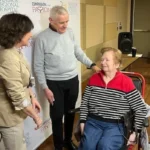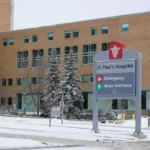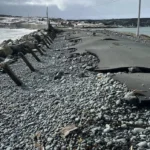[ad_1]
When Iranian missiles started raining down on Israel, many residents scrambled for canopy. Sirens wailed throughout the nation as folks rushed into bomb shelters.
However for some Palestinian residents of Israel – two million folks, or roughly 21 % of the inhabitants – doorways had been slammed shut, not by the drive of the blasts and never by enemies, however by neighbours and fellow residents.
Largely dwelling in cities, cities, and villages inside Israel’s internationally recognised borders, many Palestinian residents of Israel discovered themselves excluded from life-saving infrastructure throughout the worst nights of the Iran-Israel battle thus far.
For Samar al-Rashed, a 29-year-old single mom dwelling in a largely Jewish condominium complicated close to Acre, the truth of that exclusion got here on Friday evening. Samar was at residence along with her five-year-old daughter, Jihan. As sirens pierced the air, warning of incoming missiles, she grabbed her daughter and rushed for the constructing’s shelter.
“I didn’t have time to pack something,” she recalled. “Simply water, our telephones, and my daughter’s hand in mine.”
The panicking mom tried to ease her daughter’s concern, whereas hiding her personal, gently encouraging her in soft-spoken Arabic to maintain up along with her rushed steps in direction of the shelter, as different neighbours climbed down the steps, too.
However on the shelter door, she stated, an Israeli resident, having heard her communicate Arabic, blocked their entry – and shut it of their faces.
“I used to be surprised,” she stated. “I communicate Hebrew fluently. I attempted to elucidate. However he checked out me with contempt and simply stated, ‘Not for you.’”
In that second, Samar stated, the deep fault strains of Israeli society had been laid naked. Climbing again to her flat and looking out on the distant missiles lighting up the skies, and sometimes colliding with the bottom, she was terrified by each the sight, and by her neighbours.
A historical past of exclusion
Palestinian residents of Israel have lengthy confronted systemic discrimination – in housing, schooling, employment, and state companies. Regardless of holding Israeli citizenship, they’re usually handled as second-class residents, and their loyalty is routinely questioned in public discourse.
Based on Adalah-The Authorized Middle for Arab Minority Rights in Israel, greater than 65 legal guidelines straight or not directly discriminate in opposition to Palestinian residents. The nation-state legislation handed in 2018 cemented this disparity by defining Israel because the “nation-state of the Jewish folks”, a transfer critics say institutionalised apartheid.
In occasions of battle, that discrimination usually intensifies.
Palestinian residents of Israel are continuously subjected to discriminatory policing and restrictions in periods of battle, together with arrest for social media posts, denial of entry to shelters, and verbal abuse in blended cities.
Many have already reported experiencing such discrimination.
In Haifa, 33-year-old Mohammed Dabdoob was working at his cellular restore store Saturday night when telephones concurrently all rang with the sound of alerts, triggering his nervousness. He tried to complete fixing a damaged cellphone, which delayed him. He then rushed to shut the store and ran in direction of the closest public shelter, beneath a constructing behind his store. Approaching the shelter, he discovered its sturdy door locked.
“I attempted the code. It didn’t work. I banged on the door, known as on these inside to open – in Hebrew – and waited. Nobody opened,” he stated. Moments later, a missile exploded close by, shattering glass throughout the road. “I assumed I used to be going to die.”
“There was smoke and screaming, and after 1 / 4 of an hour, all we may hear had been the sounds of the police and the ambulance. The scene was terrifying, as if I had been dwelling a nightmare just like what occurred on the Port of Beirut,” he added, referring to the 2020 Beirut port explosion.
Frozen by sheer concern and shock, Mohammed watched from his hiding place in a close-by car parking zone because the chaos unfolded, and shortly sufficient, the shelter’s door opened. As those that had been contained in the shelter started trickling out, he checked out them silently.
“There’s no actual security for us,” he stated. “Not from the missiles, and never from the people who find themselves presupposed to be our neighbours.”
Discrimination in shelter entry
In principle, all residents of Israel ought to have equal entry to public security measures – together with bomb shelters. In observe, the image could be very completely different.
Palestinian cities and villages in Israel have considerably fewer protected areas than Jewish localities. Based on a 2022 report by Israel’s State Comptroller quoted by the newspaper Haaretz, greater than 70 % of houses in Palestinian communities in Israel lack a protected room or house that’s as much as code, in comparison with 25 % of Jewish houses. Municipalities usually obtain much less funding for civil defence, and older buildings go with out the required reinforcements.
Even in blended cities like Lydd (Lod), the place Jewish and Palestinian residents dwell aspect by aspect, inequality is pronounced.
Yara Srour, a 22-year-old nursing scholar at Hebrew College, lives within the uncared for neighbourhood of al-Mahatta in Lydd. Her household’s three-storey constructing, which is round 4 many years outdated, lacks official permits and a shelter. Following the heavy Iranian bombardment they witnessed on Saturday night, which shocked the world round them, the household tried early on Sunday to flee to a safer a part of town.
“We went to the brand new a part of Lydd the place there are correct shelters,” Yara stated, including that her 48-year-old mom, who suffers from weak knees, was struggling to maneuver. “But, they wouldn’t allow us to in. Jews from poorer areas had been additionally turned away. It was just for the ‘new residents’ — these within the fashionable buildings, largely middle-class Jewish households.”
Yara remembers the horror vividly.
“My mom has joint issues and couldn’t run like the remainder of us,” she stated. “We had been begging, knocking on doorways. However folks simply checked out us via peepholes and ignored us, whereas we noticed the sky gentle up with fires of intercepted rockets.”
Concern, trauma and anger
Samar stated the expertise of being turned away from a shelter along with her daughter left a psychological scar.
“That evening, I felt fully alone,” she stated. “I didn’t report it to the police – what’s the purpose? They wouldn’t have finished something.”
Later that night, a villa in Tamra was hit, killing 4 ladies from the identical household. From her balcony, Samar watched smoke rise into the sky.
“It felt like the tip of the world,” she stated. “And nonetheless, even below assault, we’re handled as a risk, not as folks.”
She has since moved along with her daughter to her mother and father’ residence in Daburiyya, a village within the Decrease Galilee. Collectively, they’ll now huddle in a bolstered room. With the alerts coming each few hours, Samar is considering of fleeing to Jordan.
“I needed to guard Jihan. She doesn’t know this world but. However I additionally didn’t need to go away my land. That’s the dilemma for us – survive, or keep and undergo.”
Whereas Israeli Prime Minister Benjamin Netanyahu acknowledged after the assaults that “Iran’s missiles goal all of Israel – Jews and Arabs alike,” the truth on the bottom informed a special story.
Even earlier than the battle, Palestinian residents of Israel had been disproportionately arrested for expressing political opinions or reacting to the assaults. Some had been detained merely for posting emojis on social media. In distinction, requires vigilante violence in opposition to Palestinians in on-line boards had been largely ignored.
“The state expects our loyalty in battle,” stated Mohammed Dabdoob. “However when it’s time to guard us, we’re invisible.”
For Samar, Yara, Mohammed, and 1000’s like them, the message is obvious: they’re residents on paper, however strangers in observe.
“I need security like anybody else,” stated Yara. “I’m finding out to turn into a nurse. I need to assist folks. However how can I serve a rustic that gained’t shield my mom?”
This piece was revealed in collaboration with Egab.
[ad_2]











